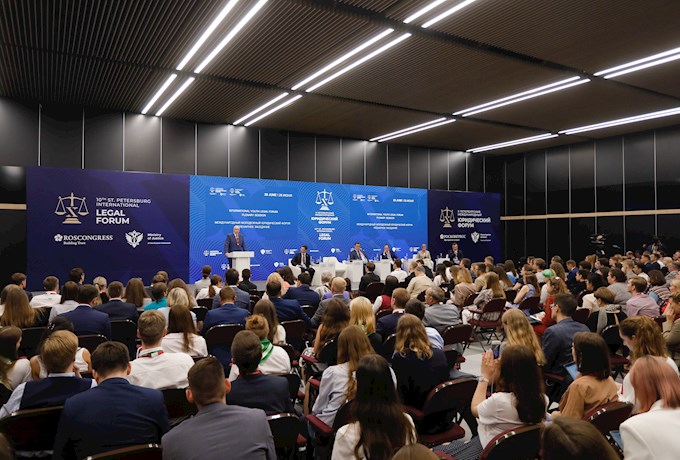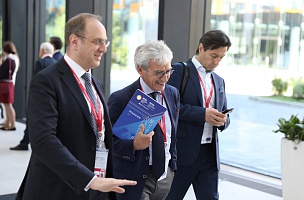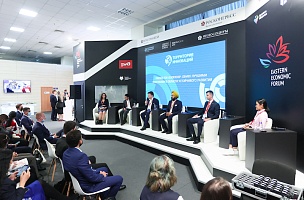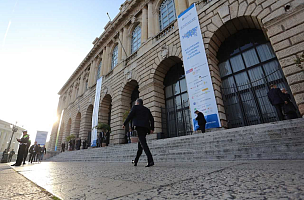KEY CONCLUSIONS
The state of the current legal education system is far from ideal
«The reforms of the 1990s and the beginning of the 21st century impacted the system of higher professional education, including legal education, in very specific ways. The transformation has been significant, and the changes occurred, and continue to occur, for the most part spontaneously rather than as a result of a deliberate policy. The resulting system is quite different in its basic makeup from the system that was in place during the Soviet period. Many experts consider it to be much less efficient and more internally contradictory, which makes it possible to say it is still far from being an ideal, balanced model,» Olga Alexandrova, Rector, The All-Russian State University of Justice.
«Russian science and education have always been foundational. First year courses always included fundamental social and political sciences like philosophy and history. Philosophical knowledge forms the basis of the theory of the state and Russian law. The history of foreign nations and Russia lends a developmental perspective with an eye to the historical past and the achievements and mistakes of Russian education. Russian and Soviet education led to ground-breaking achievements in all scientific and creative fields,» Alexander Bastrykin, Chairman, Investigative Committee of the Russian Federation.
Developments in technology create new legal relations, but traditional law remains unchanged
«There is no other way out, nor should there be, than to rely on classical notions in jurisprudence because law and relations, mediated by digital technologies as they may be, nevertheless remain relations between people. [...] The main risk for young lawyers who are fascinated by technology but still want to pursue a legal career is of being carried away by the technology itself. [...] The main thing is that it not be to the detriment of legal knowledge,» Vladislav Arkhipov, Head of the Department of Theory and History of State and Law, St. Petersburg State University.
PROBLEMS
The implementation of the Bologna Process in Russian universities has led to the abandonment of best practices in domestic education
«The education we received in Soviet times really was excellent. What happened later — the division into bachelor’s and master’s degrees — I can’t explain why it happened. At the same time, I understand that we need to improve, and legal education, among other things, has to move forward, new faculties have to appear,» Konstantin Chuychenko, Minister of Justice of the Russian Federation.
«The most important question still remains: when we started to integrate the postulates of the Bologna Process and introduce these new things into our system from outside, did we not lose what made domestic education in general and domestic higher legal education in particular strong? We can all remember that the introduction of the instruments of the Bologna Process into legal education in Russia was rather controversial and did not enjoy the unconditional support of the academic community. In the context of recent tectonic changes in the world, our state is beginning to rethink the role and importance of integration processes in education, particularly in the context of the Bologna Process,» Olga Alexandrova, Rector, The All-Russian State University of Justice.
Digitalization in education offers new opportunities but reduces the effectiveness of learning a range of skills
«The coronavirus pandemic has enabled institutions of higher education to greatly enhance the potential of online educational technologies, to fully integrate them into their educational process. There are, of course, undeniable advantages in this... However, excessive use of online education technologies and a preoccupation with the so-called digital learning space may also lead to a degradation of professional knowledge in future lawyers. Students are deprived of all or a significant amount of direct interaction with their teachers, and the communication skills that are so necessary for any lawyer suffer significantly. The student is not able to fully understand the ethics of law, the principles that take root during direct communication between a student and a teacher,» Olga Alexandrova, Rector, The All-Russian State University of Justice.
«I remember a special course [during my studies. — Ed.] on oratory by Nikolai Alekseev, our dean. Digitalization was nowhere to be seen. He would just walk into that auditorium and keep the audience on the edge of their seats for 90 minutes. You just watch the man speaking — smart, wise, knowledgeable, survived the war. How can the push of a button on a TV take the place of that? Digitalization is making all of us dumber: you press a button, and there’s your answer. We don’t walk anymore because we all drive cars. And it’s the same with this — we press the answer, and our brains don’t have to work. And when it’s time to practice, who’s going to use our brains? The boss? Not every boss is capable of turning on brains,» Alexander Bastrykin, Chairman, Investigative Committee of the Russian Federation.
SOLUTIONS
The quality of legal education should not depend on the institution, equal opportunities need to be created
«If Russian university graduates lack the education needed to find employment after a bachelor’s degree, then [universities] need to be allowed to teach for five years. It’ll take just a couple solutions: let the universities teach as long as they can, and let the weaker students study for longer. [...] The way I see it, dormitories, scientific equipment bought with budgetary funds are public property, and the state has the right to establish rights of access to this property, to this equipment. [...] Then legal education will be equal,» Nikolay Kropachev, Rector, St. Petersburg State University.
«In the 1990s, there were too many law schools with graduates who couldn’t find work. In this regard, the Ministry of Justice proposes establishing and organizing a ranking of law schools. Getting into certain places in this ranking would bring with it certain consequences,» Konstantin Chuychenko, Minister of Justice of the Russian Federation.
New areas of legal science are needed, including those related to the investigation of IT crime
«Four years ago, for the first time ever, two FSB colonels in Moscow received a bribe in the form of cryptocurrency. We had a hard time getting this through the courts. There were a lot of questions. Then the topic died down a bit, but apparently it can still happen. We will keep working, prosecuting, and investigating. [...] The topic of digital crime — they think no one will notice, but on the contrary, it leaves a trail. We’ve set up a special IT department and try to keep up with scientific and technological progress [...] In my forensics textbook, I’m getting the latest edition ready right now, there is a special chapter on IT technology in the investigation process. We are working on this topic, and we will eventually catch up,» Alexander Bastrykin, Chairman, Investigative Committee of the Russian Federation.
«Starting 1 September, we will have new disciplines — forensic science, also all [disciplines] [concerning] the activities of non-profit organizations... Because non-profit organizations, in general, have their own special features. Unfortunately, I checked a reference list, and there is no work on this topic. I am not even talking about so-called foreign agents — there isn’t anything on the subject at all. We can’t even understand on a theoretical level what a foreign agent is right now. As a matter of fact, there is no science or area of knowledge either. We will create one,» Konstantin Chuychenko, Minister of Justice of the Russian Federation.
«Technological shifts in the digitalization of the economy and social sector require that knowledge be updated constantly, that new competencies be acquired in almost every area of professional activity. Current legislation has introduced the institution of continuing education. There is currently a draft concept for the development of continuing adult education in the Russian Federation until 2025, the practical implementation of which involves revising the current system of education, focusing on the introduction of effective, flexible short-term [models. — Ed.], for example, a combination of full-time and distance learning,» Olga Alexandrova, Rector, The All-Russian State University of Justice.
Read more in the Roscongress Foundation Information and Analytical System roscongress.org






